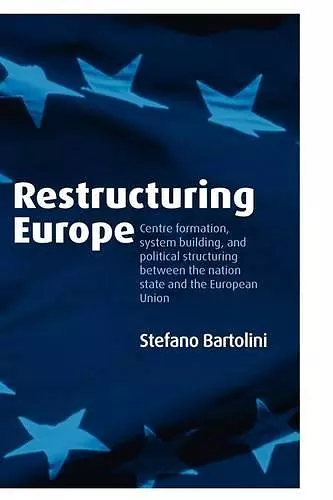Restructuring Europe
Centre Formation, System Building, and Political Structuring between the Nation State and the European Union
Format:Hardback
Publisher:Oxford University Press
Published:6th Oct '05
Currently unavailable, and unfortunately no date known when it will be back
This hardback is available in another edition too:
- Paperback£57.00(9780199231874)

Received an Honorable Mention for this year's prize for the Best Book on the EU 2005/2006 by European Union Studies Association
Presents a fresh theory of European integration. Focusing on the historical configuration of the European nation-states, this work traces the trajectories of modern-day European integration, situating it as a historical phase in the development of Europe. It answers issues, such as: Is the EU an attempt at state formation? And more.This book focuses on the historical configuration of the territorial borders and functional boundaries of the European nation state. It presents integration as a process of boundary transcendence, redefinition, shift, and change that fundamentally alters the nature of the European states. Its core concern lies in the relationship between the specific institutional design of the new Brussels centre, the boundary redefinitions that result from its political production, and, finally, the consequences of these two elements on established and developing national European political structures. Integration is examined as a new historical phase in the development of Europe, characterized by a powerful trend toward legal, economic, and cultural de-differentiation after the five-century process of differentiation that led to the European system of nation states. Considering the EU as the formation of an enlarged territorial system, this work recovers some of the classic issues of political modernization theory: Is the EU an attempt at state formation? Is it an attempt at centre formation without nation building? Is it a process of centre formation without democratization? This work also seeks to sharpen the conceptual tools currently available to deal with processes of territorial enlargement and unification. It develops a theoretical framework for political structuring beyond the nation state, capable of linking all aspects of EU integration (inter-governmentalism, definition of rights, the 'constitutionalization' of treaties, the tensions between the new territorial hierarchy and the nation states, etc.). The book adopts an 'holistic' approach to integration, in the form of a theory from which hypotheses can be generated (even if it is not possible to test all of its components). This theoretical framework has three principal aims: to overcome a rigid distinction between domestic politics and international relations; to link actors' orientations, interests, and motivations with macro outcomes; and to relate structural profiles with dynamic processes of change.
It is fascinating because Bartolini shares with us his broad and extensive knowledge of European history and politics. The parts where he cuts through disciplinary boundaries and decades, if not centuries, of history and politics are a pleasure to read. One cannot but admire scholars that have the gift of both perusing and condensing such a broad field of knowledge. * EUSA Review *
ISBN: 9780199286430
Dimensions: 242mm x 164mm x 30mm
Weight: 803g
448 pages